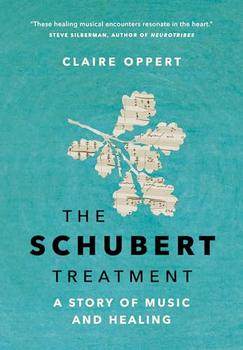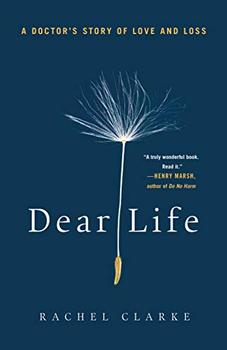Summary | Excerpt | Reviews | Beyond the book | Read-Alikes | Genres & Themes | Author Bio

A Story of Music and Healing
by Claire OppertClaire Oppert fell in love with music at an early age and trained to make a career as a classical cellist. But her grandfather, father, and brother were all doctors, and Oppert, influenced particularly by her father's use of music in his practice, eventually found herself visiting nursing homes and medical centers to play for the residents and patients. Inspired by the immensely positive effects of music in these settings, Oppert began to develop a scientific study to prove its healing powers. The Schubert Treatment (translated from the French by Katia Grubisic) shares stories from Oppert's work, and the stories of others whose lives demonstrate the medicinal power of music.
Oppert's book is divided into vignettes featuring her work with specific individuals over the years; alternate vignettes share more biographical stories about her growth and work as a musician, her return to school for music therapy, and the development of a clinical trial for the Schubert Treatment—the calming effect of music that reduces pain and anxiety, named after the famous Austrian composer, Franz Schubert.
Although the narrative moves back and forth in time, setting, and topic, Oppert deftly entwines the vignettes, her authorial skill made apparent by the flow of her writing, which is as lyrical and evocative as her musical performance. The individuals for whom Oppert played were diagnosed with autism or dementia, or were receiving end-of-life palliative care, and she shares detailed descriptions of their reactions to her music. Some reactions were gentle, with listeners becoming peaceful, while at other times the music incited violent outbursts. Oppert tells of one boy who punched and broke her cello when she played one particular song; any other song invoked curiosity and delight. Over the course of many sessions, a non-speaking child came to sit at the piano and play along with Oppert. She describes each of her encounters with kindness and honesty, showing how music can elicit reactions and responses that sometimes can't be produced even with medication.
As Oppert's sessions continued, she eventually began to develop the Schubert Treatment along more scientific guidelines. After obtaining a degree in art therapy, she started working with Dr. Jean-Marie Gomas in the palliative care unit at the Sainte-Périne hospital in Paris, and in 2013, the pair began an official clinical study of the Schubert Treatment. The primary objective of the study was to reduce pain and anxiety during unpleasant nursing procedures, notably blood work, by using music as sensory counter-stimulation. The initial trial included 200 treatments over three years, with 112 providing usable data. In 2016, Oppert and Gomas published their results, demonstrating a 10-50% reduction in patient pain and an approximate 90% reduction in patient anxiety. Significantly positive effects on caregivers were also noted. These findings support Oppert's observations of the analgesic ability of music on patients as well as its ability to bring joy to all who hear it.
The Schubert Treatment is a short but powerful memoir that highlights the unlikely meeting between medicine and live music. Oppert's writing is emotional and detailed, bringing individuals to life in only a few pages, and the inclusion of specific pieces of music at the beginning of each vignette provides a soundtrack to further connect with her work. This memoir is a heartwarming show of the unique power of music to connect and heal people at all levels of health.
![]() This review
first ran in the October 16, 2024
issue of BookBrowse Recommends.
This review
first ran in the October 16, 2024
issue of BookBrowse Recommends.

If you liked The Schubert Treatment, try these:

by Andrew Leland
Published 2024
A witty, winning, and revelatory personal narrative of the author's transition from sightedness to blindness and his quest to learn about blindness as a rich culture all its own

by Rachel Clarke
Published 2020
In Dear Life, palliative care specialist Dr. Rachel Clarke recounts her professional and personal journey to understand not the end of life, but life at its end.
Your guide toexceptional books
BookBrowse seeks out and recommends the best in contemporary fiction and nonfiction—books that not only engage and entertain but also deepen our understanding of ourselves and the world around us.